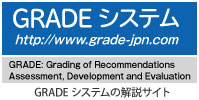診断検査精度のワークショップとGRADE
以下の#3のメタアナリシスについては”R”を使うようだ。(^^)
http://portal.juliuscentrum.nl/…/language/en-US/Default.aspx
1. Systematic reviews of diagnostic test accuracy (March 2 and 3, 2015)
In this two-day workshop staff members of the DCC will address all aspects regarding question formulation, identification and appraisal of primary studies, meta-analysis and interpretation of a body of evidence regarding diagnostic tests. This is done by following all steps of a systematic review. The workshop is essential for understanding the subject matter of the other two workshops and is directed to healthcare workers, clinicians, researchers, guideline developers and policy makers, who wish to know more about systematically reviewing and synthesising diagnostic evidence.
2. GRADE for diagnosis (March 9, 2015)
Prof Holger Schünemann and dr. Joerg Meerpohl, experts from the international GRADE Working Group, will take you to the process of preparing Summary of Findings Tables and assigning Levels of Evidence to a body of diagnostic evidence according to the GRADE-method. GRADE is recognised as the leading method of appraising the level of evidence to outcomes that are critical for making clinical decisions and recommendations. A framework for going from evidence to recommendation will also be part of this one-day workshop. The workshop is particularly directed to guideline developers and policy makers, but is also very useful for healthcare workers, clinicians and researchers, who wish to learn more about preparing Summary of Findings Tables and applying GRADE for diagnostic questions in systematic reviews or daily practice.
3. Meta-analysis of diagnostic test accuracy (March 23, 2015)
This one-day hands-on workshop will address meta-analysis of diagnostic test accuracy. This type of meta-analysis requires complex statistical methods and special software packages, such as R, Stata or SAS. Participants will be introduced into the ins and outs of hierarchical and bivariate models for diagnostic meta-analysis and practice those methods on the spot. This workshop is intended for researchers (statisticians and epidemiologists), but is also very useful for healthcare workers, clinicians, guideline developers and policy makers who wish to perform diagnostic meta-analyses.


